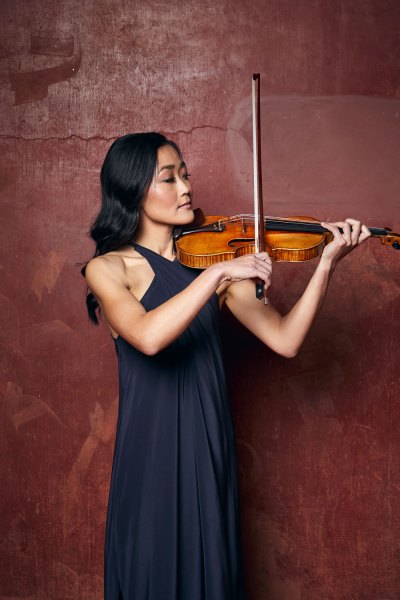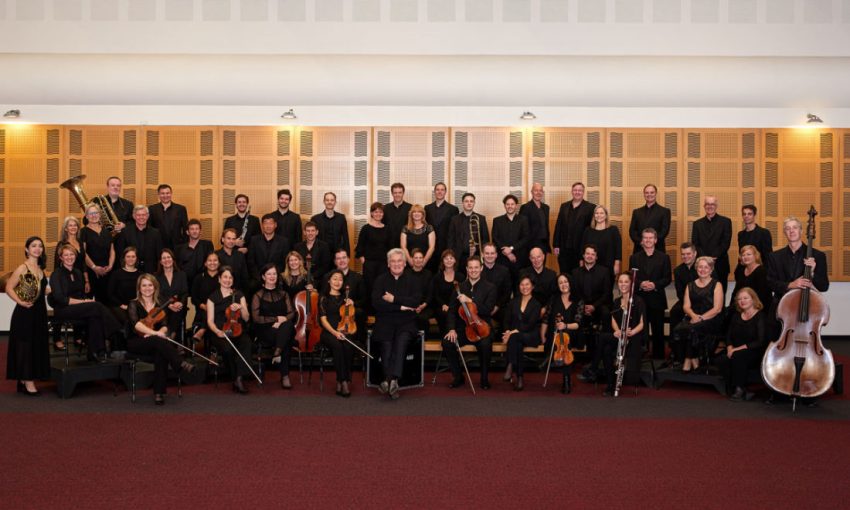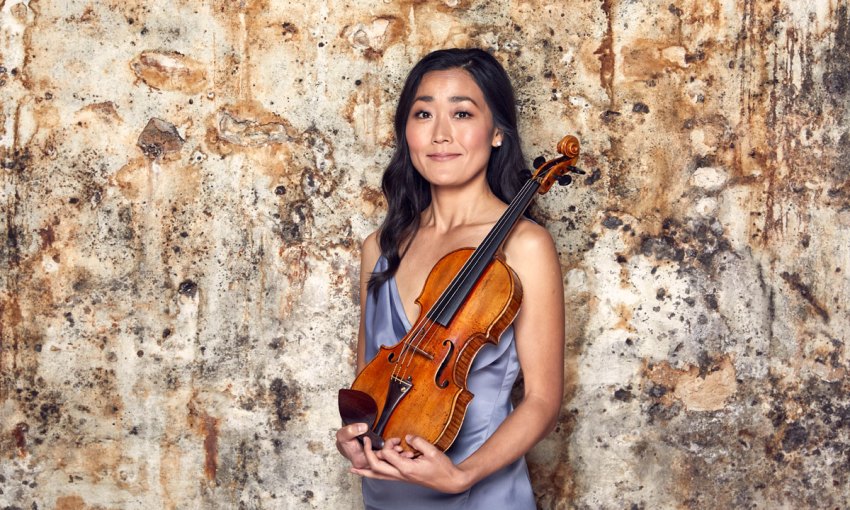Natsuko Yoshimoto has been playing violin since the age of three and is considered one of Australia’s finest violinists. But the much-loved ASO concertmaster – who will take the spotlight in the orchestra’s Natsuko Plays Brahms concert next month – admits she still suffers nerves when she performs.
“I always have nerves … every single time”
“I’m one of these nerds who loves playing and practising,” Natsuko Yoshimoto laughs, when asked how many hours she spends playing the violin each day.
“I would happily do six hours of rehearsing then go home and practise for a few hours – for me, that’s like nourishment. I need it; I need to be doing it.”
Playing an instrument, Natsuko says, can be like fitness: without regular activity, it’s easy to lose the rhythm and difficult to get it back. But she doesn’t practise just to maintain her high standard.
“I practise because I still hope to get better … I want to search further, I want to keep learning and keep improving.
“That’s why I find the work so inspiring. You have this constant stream of people coming in – artists and conductors – who make you think about different things.”
Natsuko has been the Adelaide Symphony Orchestra’s concertmaster for more than a decade, with ASO managing director Vincent Ciccarello crediting her with playing a significant role in the orchestra’s success.
At the end of October, however, she will be moving on. Her husband, Imants Larsen, took up the role of principal viola with the Queensland Symphony Orchestra last year and the couple and their two young children are now based in Brisbane, with Natsuko regularly commuting to meet her commitments with the ASO.
“I’m sad to go, but I feel like it’s the right time to move on,” she says, adding that the orchestra is in a good place musically.
“It’s a chance for someone else to take this spot, because it’s a very special position.”
 Natsuko was in her early 30s when she was appointed concertmaster of the Adelaide Symphony Orchestra and, despite her extensive experience playing with ensembles, orchestras and string quartets all over the world, she admits the role was a steep learning curve.
Natsuko was in her early 30s when she was appointed concertmaster of the Adelaide Symphony Orchestra and, despite her extensive experience playing with ensembles, orchestras and string quartets all over the world, she admits the role was a steep learning curve.
“It’s pretty much all-encompassing. It’s leadership in lots of areas – I had no idea when I came into this job.
“There’s nothing to really prepare you for it. Suddenly you’re in a leadership role but of an organisation of about 75 people of all ages, and some people have been in this organisation for over 40 years.
“You’re dealing with a lot of people with different levels of experience … what I’ve learned is that if you treat everybody with respect then hopefully they will give you that back.”
Natsuko acknowledges that the “human interaction” in an orchestra can be complicated, because everything feels very personal for the musicians. But while she hadn’t previously been a member of a large orchestra, certain principles held true.
“I came in thinking it was just a bigger version of chamber music and I still believe that it is. It’s all about listening and responding, and when that happens it’s really magical; everyone has to be really in tune with each other but also be trusting and open. What I tried to do is encourage that aspect.
“The atmosphere of this orchestra is very friendly and supportive, and that’s not always the case with orchestras.”
The concertmaster is always conscious of setting a good example and says she still suffers nerves – not just before concerts, but also rehearsals.
“I always have nerves. I have it every single time. I have it for rehearsals … I always feel pressure that I have to always be on top of things and I don’t want to let people down in my position.”
The first rehearsal, she says, is the most nerve-wracking.
“You never know what to anticipate, especially if you’ve never worked with the conductor before – it’s like a first date. And that has not gone away, not at all.
“You are in an environment where everyone is watching you, so there is an element of self-consciousness as well – it’s just a combination of things. And there’s nothing more difficult than being watched by your colleagues, and that starts for me from the rehearsal.”
Natsuko still has plenty of concerts to play with the ASO before she leaves, with one of the highlights being the second Master Series show of the year, Natsuko Plays Brahms, to be conducted by Mark Wigglesworth at the Town Hall on April 3 and 4. It will see her take on Brahms’ Violin Concerto, a work the orchestra program notes “has been variously described as a concerto against violin, and ‘for violin against orchestra – and the violin wins!’”.
“It’s because it’s quite a symphonic piece,” Natsuko says. “It starts with a big orchestral tutti at the beginning so the soloist doesn’t really play for a while and the same thing happens in the second movement.
“Concertos are always tricky anyway because it’s one person against the orchestra so I think those kinds of comments started because sometimes it feels like you’re working so hard and the force of the orchestra is so powerful … a lot of the material is introduced first in the orchestra, so I suppose in that aspect it’s a bit like the violin is kind of fighting the position against the orchestra.”
In her final year with the orchestra, Natsuko is thrilled that the program will showcase a range of violin concertos with different soloists. She is especially looking forward to this weekend’s Mahler 5 / Adès concert – part of the Adelaide Festival program – which will see British musician Anthony Marwood play contemporary composer Thomas Adès’ violin concerto Concentric Paths.
Another anticipated highlight of 2020 is the Beethoven Symphony Cycle, a tribute for the 250th anniversary of the composer’s birth. The ASO will play nine symphonies over four concerts across two weeks in September under the baton of Mark Wigglesworth, one of Natsuko’s favourite conductors.
“I always love working with him … he always brings incredible depth and understanding to whatever piece he is doing with us. Everything I have worked on with him has been a highlight.”

One of Natsuko’s most memorable experiences with the ASO was the visit last year to China and South Korea, where it gave a number of performances including at the Beijing Music Festival and Shanghai International Arts Festival.
The trip was an excellent bonding experience for the musicians, she says. Away from home, families and their usual daily routines, they were fully focused on one shared goal: “to give the best concerts”.
“All you have to do is perform and somehow that focus and everyone being in that environment of real excitement and wanting to showcase ourselves to the world, it was such a positive experience for the orchestra.
“And, I think, it’s important, because one can easily feel quite isolated here, just because Australia is so far away. To feel that connection with the rest of the music world is important to us, and to know that we can stand proudly alongside them.”
Natsuko doesn’t have a new role lined up when she leaves the ASO at the end of October, saying she is happy to have some space to pursue her own projects. She is keen to do more chamber music, and also more teaching.
Asked whether her own son and daughter, aged six and four, are showing any musical inclination yet, she says she’d like them to start with a choir.
“I think singing is the best way of learning to make music – it’s relating to others and singing in a group; it’s good socially and there are just so many positive aspects, in a way [it’s] similar to being in an orchestra.”
The children do have a small violin, but as Natsuko well knows – patience and sustained practice are just as important as any inherited musical talent.
“The problem with the violin is that it’s a very difficult instrument for a long time … it’s a painful journey for a long time!”
Since the publication of this article, the Adelaide Symphony Orchestra has announced that the Natsuko Plays Brahms performances at the Adelaide Town Hall on April 3 and 4 will no longer be public events, due to the COVID-19 situation. The ASO is working with all partners to confirm information about potential recording/broadcast of this event.
including free delivery to your door.



